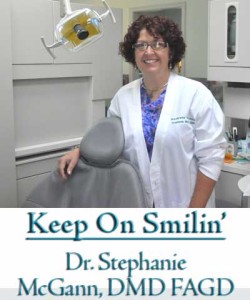Habitual grinding of teeth — bruxism — can cause more damage than you might think
By Dr. Stephanie McGann, DMD FAGD, Columnist, The Times
 While most people clench or grind occasionally some people do it on a regular basis. This clenching and grinding is known as bruxism and can cause damage to teeth and the bones that support them. Most people don’t know they do it until their dentist or hygienist points out the damage it causes.
While most people clench or grind occasionally some people do it on a regular basis. This clenching and grinding is known as bruxism and can cause damage to teeth and the bones that support them. Most people don’t know they do it until their dentist or hygienist points out the damage it causes.
Everyday, I am asked why people grind. Some people grind to relieve stress and anxiety. More often it is caused by a poor bite or a missing or crooked tooth. This nocturnal grinding was once considered nature’s way of getting teeth to “fit together.” There are a few ways to tell if you are one of many who are clenching or grinding at night.
Do you ever wake up with, a dull or thudding headache, a tender jaw or sore facial muscles? Has a loved one ever mentioned that you grind your teeth at night? If it can be heard by someone else the grinding is significant. If you think you are a “bruxer” talk to your dentist. He or she can see wear marks on your teeth, feel for muscle tenderness in the jaw or spot other abnormalities such as cracks or broken dental work that can be attributed to clenching and grinding.
Bruxism is serious. Nighttime clenching and grinding can cause broken or loose teeth. Teeth can have their protective enamel layer worn completely off by grinding. The nerve tissues inside of teeth can become inflamed sometimes causing the need for root canal therapy. Cracks in teeth may need to be treated with crowns or in some cases teeth have been lost to excessive grinding. Changes in the TMJ (jaw joint) often occur with Bruxism and can lead to long term pain in the area.
Children often grind their teeth but usually for different reasons. It’s not uncommon for a child to grind as they are erupting teeth. Kids may grind as their baby teeth emerge and again when they are growing into their permanent teeth. This grinding almost always occurs during sleep and usually stops when the teeth have fully erupted and their bite has stabilized. In some rare cases this grinding does not resolve, other factors may be involved in these cases and a detailed evaluation by both a dentist and physician may uncover the underlying cause. With all grinding it is important to protect the teeth from excessive wear. Your dentist can work with you to develop a plan that will work for you.
Bruxism is not choice. You just can’t say “I quit.” Left untreated it can be the start of a lifetime of dental problems. There are options. First, for nocturnal grinders a night guard is essential. Your dentist will help find the appliance that provides the most protection from the damage and wear caused by clenching and grinding. There are a wide variety of appliances, some are more focused on the jaw joint (TMJ) others are purely designed to protect the teeth from wear. The most important factor, in my opinion, is comfort and ease of use. An appliance is useless if it is not worn.
What about the cost? In today’s economic climate it is always a concern. There are a wide range of appliance types and a range of fees for each type. Communicate with your dentist, he or she can help explain the pros and cons of each as well as the fees. Keep in mind, a well fitting, comfortable guard that is worn nightly can prevent the need for significantly more expensive dental work in the future.
There are some recommendations to help reduce the amount of grinding. Avoid caffeine before bed, even if it doesn’t keep you up it can intensify grinding.
Break daytime chewing habits. Habitual chewers of things like pens or other non food items carries over into nighttime grinding. Train yourself to relax your jaw during daytime stress moments. Anger management techniques – these relaxation techniques can help.
Researchers suspect that stress or anger may lead to tooth grinding. A 2010 study found that people with sleep bruxism were more likely than people who don’t grind their teeth to report trouble at work and other physical manifestations of stress. Avoid the seriously hard crunch – biting hard candy, chewing ice, that crunch can be habit forming. Place your tongue between your front teeth. This motion will help relax the muscles involved in clenching and grinding. Take the necessary dental steps to develop a stable bite. Ask your dentist to evaluate your bite for contributing factors.
Teeth are tough and are meant to last a lifetime with proper maintenance. If you think you may be damaging your teeth let your dentist know. Ask your dentist or hygienist about ways to protect your teeth at your next visit.
Dr. Stephanie McGann is a resident of the Unionville area and along with her partner, Dr. Marie Scott, operates The Brandywine Smile Center, a family-friendly dental practice in Concordville. She is a Fellow of the Academy of General Dentistry.







Trackbacks